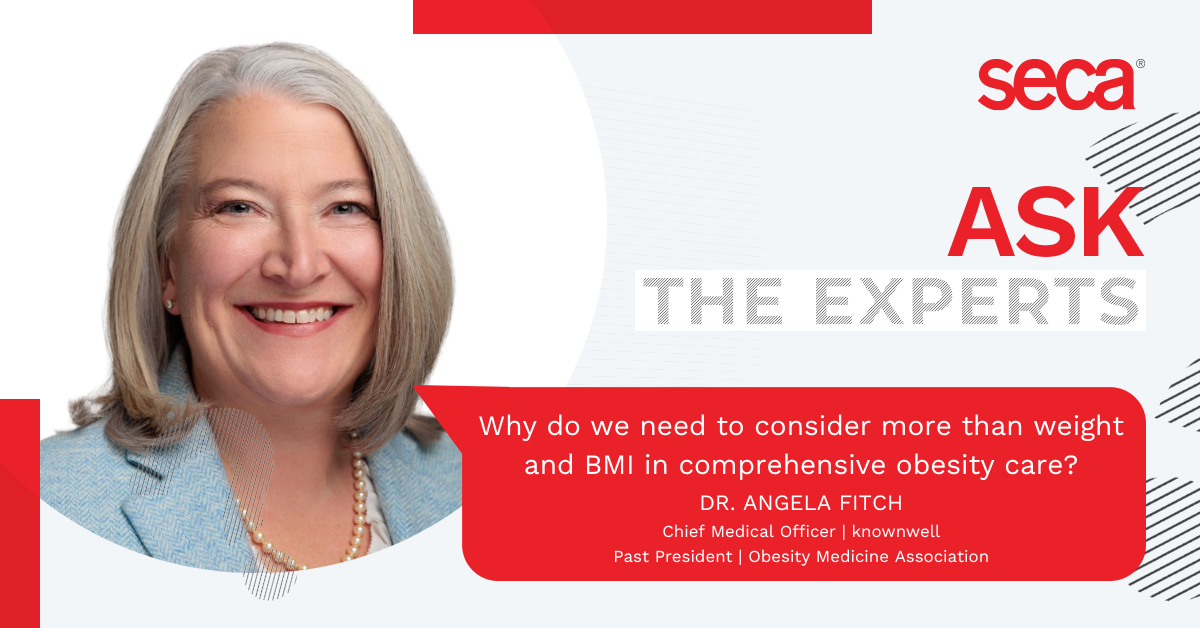Ask The Experts: Why Do We Need to Consider More Than Weight/BMI in Comprehensive Obesity Care?
In comprehensive obesity care, it’s essential to look beyond just weight and BMI for assessment, diagnosis, and treatment. Obesity is a chronic, relapsing disease that requires a holistic approach, including evidence-based interventions like dietary changes, lifestyle modifications, physical activity, medication, and surgery when necessary. Focusing only on weight and BMI overlooks broader aspects of quality of life and functional well-being. Comprehensive care demands a deeper understanding of an individual’s health beyond simple numbers.
One key limitation of BMI is its inability to distinguish between muscle and fat. A person with high muscle mass may have a high BMI, categorizing them as overweight or obese, despite having a healthy body composition. Conversely, someone with a normal BMI might have a high body fat percentage, putting them at risk for metabolic diseases. This discrepancy highlights the need for more precise measurements, like body composition analysis, to accurately assess health status and obesity-related risks.
Professional associations are now collaborating to establish a consensus that BMI serves as a screening tool for obesity but does not directly measure body fat. This consensus is crucial because it underscores the importance of interpreting BMI in the context of the disease’s overall impact on health, mortality, and the risk of chronic diseases.
Read the Collaborative Statement from Six U.S. Obesity Treatment & Prevention Organizations here.
Focusing solely on weight loss can lead to unhealthy practices, such as extreme dieting or excessive exercise, which might cause muscle loss rather than fat loss. Preserving muscle mass is crucial for maintaining metabolic health, physical strength, and overall functionality. A comprehensive approach to obesity care emphasizes balanced nutrition, adequate protein intake, and resistance training to support healthy weight loss and improve body composition.
Comprehensive obesity care also considers psychological factors, like body image and emotional well-being, which significantly impact adherence to treatment plans. Behavioral therapy and support groups are vital in helping individuals make sustainable lifestyle changes. By addressing these broader aspects of obesity, healthcare providers can create personalized, effective treatment plans that improve overall health and quality of life.
In conclusion, while BMI is a useful initial screening tool, a more comprehensive approach is essential in obesity care. By incorporating additional measures like body composition analysis and considering psychological factors, healthcare providers can offer more accurate assessments and effective treatments. This holistic approach ensures individuals receive the support needed to achieve and maintain a healthier lifestyle, enhancing their quality of life and reducing the risk of chronic diseases.
Recommended Episodes
Episode 49: Wellness, Weight Management, and White Lotus
In this episode, Dr. Nina Crowley and Jeannie Boyer, RD, explore body composition analysis, its role in holistic obesity care, and the shift from traditional weight loss models to personalized health strategies. They also break down White Lotus’s take on body composition! Listen now for a fresh perspective.
Watch episodeEpisode 48: Looking at the Lancet Report on Clinical Obesity from the Patient POV
Sarah Le Brocq joins In the Know with Nina to discuss the Lancet Commission’s recommendations for redefining obesity diagnosis. The conversation explores moving beyond BMI, using body composition analysis, and addressing treatment access challenges. Hear the patient perspective on how these changes could impact obesity care. Listen now.
Watch episodeExplore the evolving role of Registered Dietitians in obesity care with Dr. Nina Crowley and RD Linda Gigliotti. This episode dives into Incretin-Based Therapies, nutrition counseling, and body composition monitoring to support patient-centered care.
Watch episodeseca north america
Medical Measuring Systems and Scales since 1840
13601 Benson AvenueChino, CA 91710
USA
seca Service
As the world leader in medical scales, we also offer you first-class service. Together with our branches, partners and dealers, seca offers a worldwide service network that ensures our products work troublefree.
All rights reserved seca 2023



